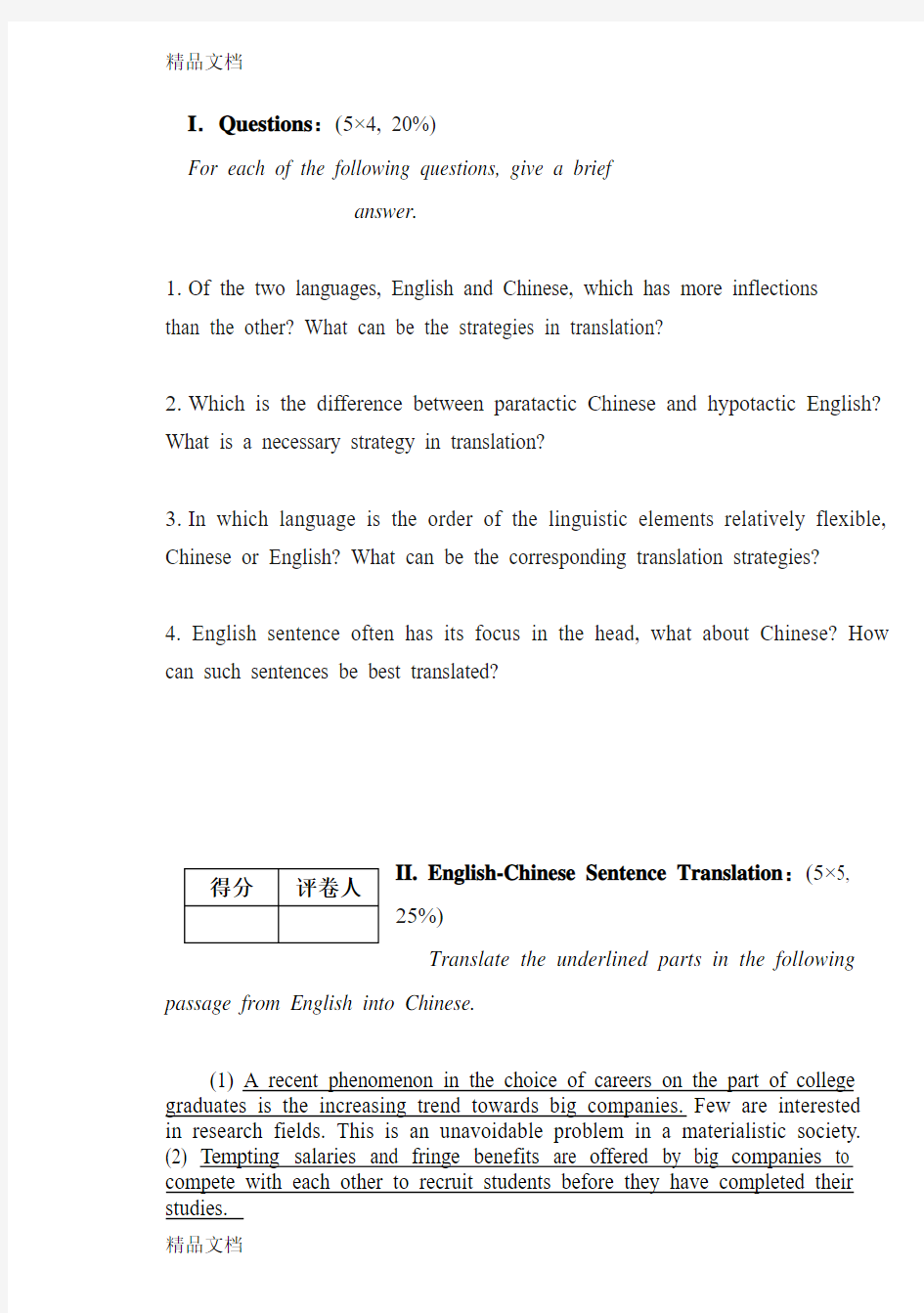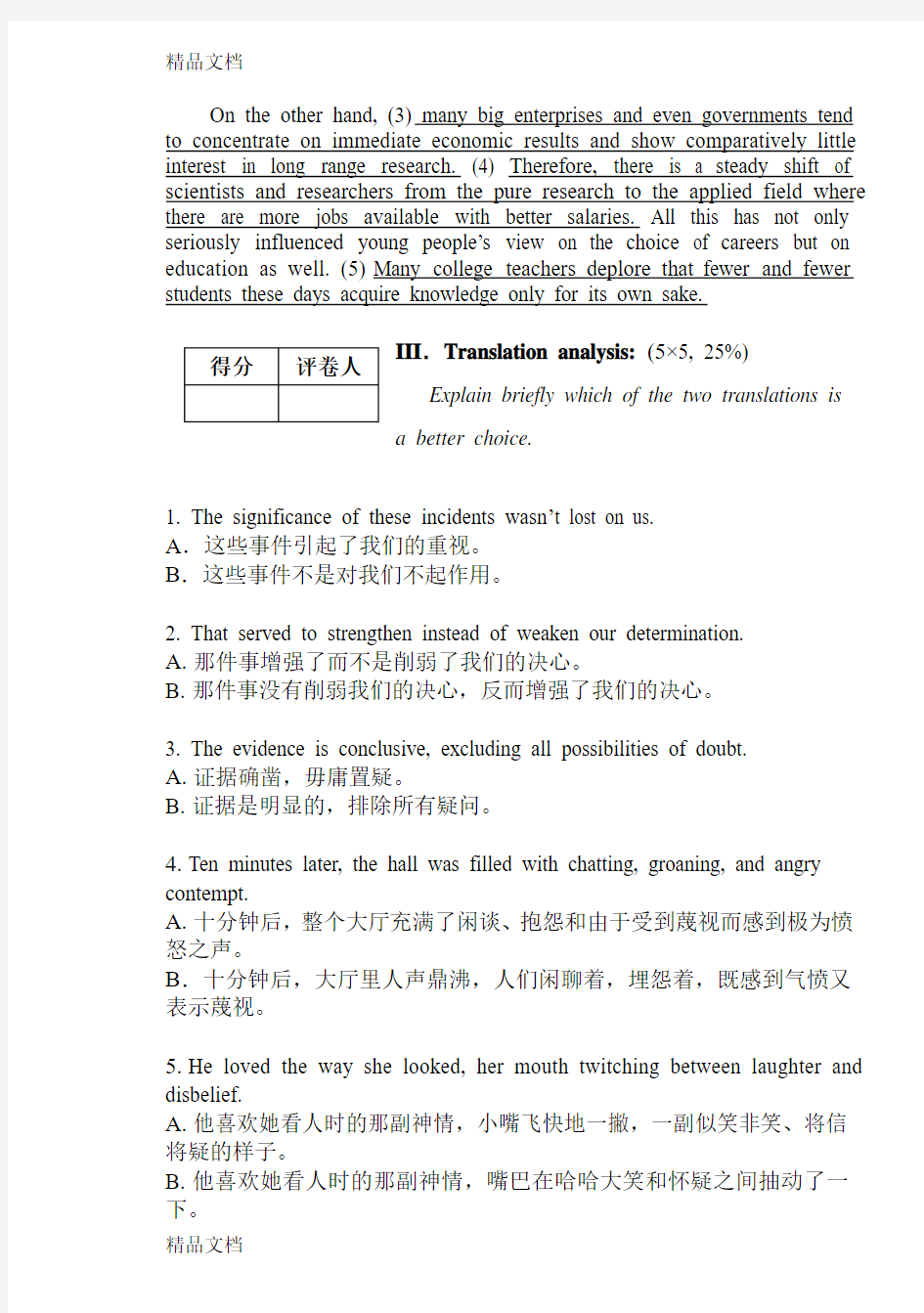最新翻译理论与实践试卷及答案


I.Questions:(5×4, 20%)
For each of the following questions, give a brief
answer.
1.Of the two languages, English and Chinese, which has more inflections
than the other? What can be the strategies in translation?
2.Which is the difference between paratactic Chinese and hypotactic English? What is a necessary strategy in translation?
3.In which language is the order of the linguistic elements relatively flexible, Chinese or English? What can be the corresponding translation strategies?
4. English sentence often has its focus in the head, what about Chinese? How can such sentences be best translated?
II. English-Chinese Sentence Translation:(5×5, 得分评卷人
25%)
Translate the underlined parts in the following passage from English into Chinese.
(1) A recent phenomenon in the choice of careers on the part of college graduates is the increasing trend towards big companies. Few are interested in research fields. This is an unavoidable problem in a materialistic society.
(2) Tempting salaries and fringe benefits are offered by big companies to compete with each other to recruit students before they have completed their studies.
On the other hand, (3) many big enterprises and even governments tend to concentrate on immediate economic results and show comparatively little interest in long range research. (4) Therefore, there is a steady shift of scientists and researchers from the pure research to the applied field where there are more jobs available with better salaries. All this has not only seriously influenced young people’s view on the choice of careers but on education as well. (5) Many college teachers deplore that fewer and fewer students these days acquire knowledge only for its own sake.
III.Translation analysis: (5×5, 25%)得分评卷人
Explain briefly which of the two translations is
a better choice.
1. The significance of these incidents wasn’t lost on us.
A.这些事件引起了我们的重视。
B.这些事件不是对我们不起作用。
2. That served to strengthen instead of weaken our determination.
A.那件事增强了而不是削弱了我们的决心。
B.那件事没有削弱我们的决心,反而增强了我们的决心。
3. The evidence is conclusive, excluding all possibilities of doubt.
A.证据确凿,毋庸置疑。
B.证据是明显的,排除所有疑问。
4.Ten minutes later, the hall was filled with chatting, groaning, and angry contempt.
A.十分钟后,整个大厅充满了闲谈、抱怨和由于受到蔑视而感到极为愤怒之声。
B.十分钟后,大厅里人声鼎沸,人们闲聊着,埋怨着,既感到气愤又表示蔑视。
5.He loved the way she looked, her mouth twitching between laughter and disbelief.
A.他喜欢她看人时的那副神情,小嘴飞快地一撇,一副似笑非笑、将信将疑的样子。
B.他喜欢她看人时的那副神情,嘴巴在哈哈大笑和怀疑之间抽动了一下。
IV . English-Chinese Paragraph Translation : (15%) Translate the following English into Chinese.
In an overcrowded country, very few people own enough to make them financially independent; very few people are in a position to accumulate purchasing power. Moreover, in any country where population presses hard upon natural resources, the general economic situation is apt to be so precarious that government control of capital and labor, production and consumption becomes inevitable. It results that democratic ideals will not work in conditions of poverty and extreme social unrest.
V . Chinese-English Paragraph Translation: (15%) Translate the following Chinese into English .
今天的发展不能以牺牲将来为代价。应当看到中国过去二十年的经济迅速发展带来很大的代价。我们喝的水被污染了,我们呼吸的空气被污染了。森林越来越少了。这个代价还不只是环境上的。代价还有社会风气的变坏。
I. Questions : (5×4, 20%) 得分
评卷人
得分
评卷人
